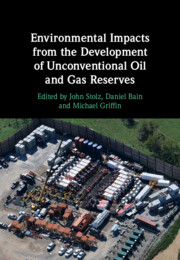Book contents
- Environmental Impacts from the Development of Unconventional Oil and Gas Reserves
- Environmental Impacts from the Development of Unconventional Oil and Gas Reserves
- Copyright page
- Contents
- Figures
- Tables
- Contributors
- Preface
- Part I Overview
- Part II Environmental Analysis
- 5 Air Quality
- 6 Methane and Climate Change
- 7 Water Usage and Management
- 8 Seismicity Induced by the Development of Unconventional Oil and Gas Resources
- 9 Naturally Occurring Radioactive Material (NORM)
- 10 Metal Isotope Signatures as Tracers for Unconventional Oil and Gas Fluids
- 11 Isotopes as Tracers of Atmospheric and Groundwater Methane Sources
- 12 The Microbiology of Shale Gas Extraction
- Part III Case Studies
- Index
- References
7 - Water Usage and Management
from Part II - Environmental Analysis
Published online by Cambridge University Press: 28 July 2022
- Environmental Impacts from the Development of Unconventional Oil and Gas Reserves
- Environmental Impacts from the Development of Unconventional Oil and Gas Reserves
- Copyright page
- Contents
- Figures
- Tables
- Contributors
- Preface
- Part I Overview
- Part II Environmental Analysis
- 5 Air Quality
- 6 Methane and Climate Change
- 7 Water Usage and Management
- 8 Seismicity Induced by the Development of Unconventional Oil and Gas Resources
- 9 Naturally Occurring Radioactive Material (NORM)
- 10 Metal Isotope Signatures as Tracers for Unconventional Oil and Gas Fluids
- 11 Isotopes as Tracers of Atmospheric and Groundwater Methane Sources
- 12 The Microbiology of Shale Gas Extraction
- Part III Case Studies
- Index
- References
Summary
The water demand associated with unconventional fossil fuel extraction and the management of the associated produced wastewater present significant environmental challenges. Water usage for unconventional fossil fuel extraction varies in different areas of the country, but overall is a small fraction of total water withdrawals for most locations. Produced water volumes and quality also vary nationwide, and disposal can have significant environmental impacts, especially if produced water is discharged to surface waters. This work discusses water use and requisition, changes in quantity and management of produced water nationwide from 2007 to 2017, and the environmental effects of management options. As unconventional natural gas production expands, selection of management options that do not lead to significant environmental impacts must be prioritized.
Information
- Type
- Chapter
- Information
- Publisher: Cambridge University PressPrint publication year: 2022
References
Accessibility standard: Unknown
Why this information is here
This section outlines the accessibility features of this content - including support for screen readers, full keyboard navigation and high-contrast display options. This may not be relevant for you.Accessibility Information
- 1
- Cited by
